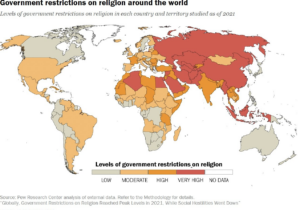The Trump administration is considering reducing the already small number of refugees who are allowed into the refugee resettlement program. There have even been reports of reducing the number to zero. In 2018, refugee resettlement hit a record low as the US took in just 22,491 refugees, fewer than half of the permitted people under the reduced refugee ceiling of 45,000.
America has a long history of welcoming refugees fleeing persecution and violence, and for years has been the world’s leading country for refugee admissions. Yet due to the declining refugee ceiling over the past five years, for the first time since the Refugee Act in 1980 the US is no longer a leader in this important area. According to a report released by the United Nations High Commissioner for Refugees (UNHCR), “By the end of 2018, almost 70.8 million individuals were forcibly displaced worldwide as a result of persecution, conflict, violence, or human rights violations.” The number of refugees globally is at the highest levels since World War II. The US has the resources and ability to contribute to a global response to this crisis, the foundation of which is just and compassionate refugee resettlement policy.
Successive and dramatic cuts to refugee admissions have had devastating effects for people who have been persecuted globally for their faith, particularly Christians. According to OpenDoors USA, one in nine Christians experience high levels of persecution worldwide. Global Christian persecution has risen by 14 percent from last year, resulting in 245 million Christians experiencing some level of persecution. The United States Commission on International Religious Freedom (USCIRF) reports that many of the nations that most regularly violate religious freedom also produce some of the largest refugee populations. Religious persecution causes people to flee their homes, communities, and nations.
It is surely true that the US cannot allow an unlimited number of people into the country because no nation has the necessary resources needed to provide proper care. Solving the global refugee crisis does not fall to the United States alone. But America has always been and should remain a place that welcomes and provides safety for vulnerable people who have fled persecution. As there’s a growing number of persecuted people, the US should revise its refugee policies and ensure that a robust program continues. The administration is in control of setting the annual refugee ceiling and has the power to restore the number of refugees allowed into the United States to recent historical averages. As President Donald Trump has said, he takes international religious freedom seriously[1] [2] [3] [4] [5] and is planning on addressing this issue at the upcoming United Nations Global Assembly in New York. Welcoming those who are fleeing their homes because of their faith to the United States is a crucial part of an American response to global religious persecution. In 2018, 15,748 Christian refugees entered the country, a 36.4 percent decline from the previous year and a 55 percent decline from fiscal year 2016.
A diverse variety of stakeholders have raised their concerns over the proposed cuts to the program. Earlier this summer, members of the Evangelical Immigration Table sent President Trump a letter regarding this issue: “We pray you will reject any advice to shut the refugee resettlement program down, and that your administration will not merely continue the program at its current, vastly reduced level. Instead, we ask that you allow our county to continue to be a beacon of safety and freedom for those fleeing persecution.”
Senators James Lankford (R–Okla.) and Chris Coons (D–Del.) sent a bipartisan letter to the administration stating that “at a time when we are facing the ‘highest levels of displacement on record,’ according to the United Nations Refugee Agency, we urge you to increase the refugee resettlement cap and to admit as many refugees as possible within that cap. America has a responsibility to promote compassion and democracy around the world through assistance to vulnerable and displaced people.”
The administration should maintain a robust refugee resettlement program and consider increasing the refugee ceiling so we can continue to be a welcoming country for the world’s most vulnerable people.






